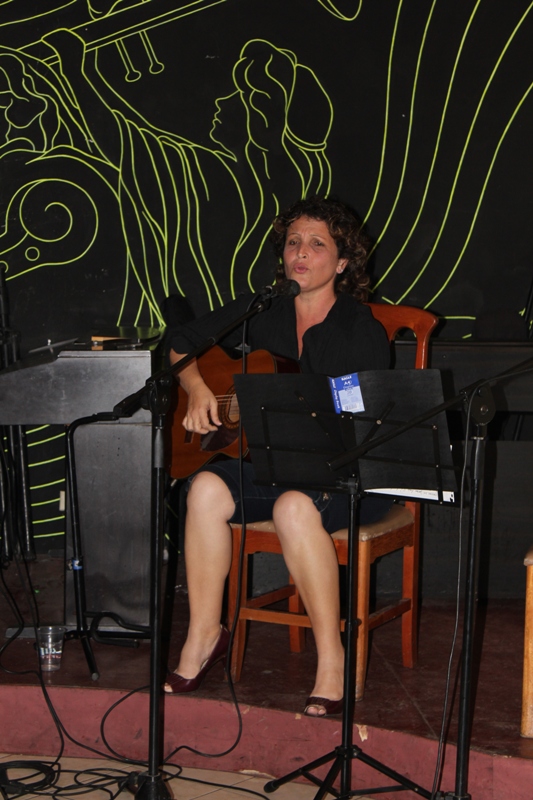
This happened to me a few days ago, on January 12th. I wandered about the city in the middle of the heat, searching for a good photo to take to upload on the blog. That was when they informed me that my friend, Ivet Maria Rodriguez, was going to present her CD at the Piano-Bar. So I head out over there.
It was really a splendid afternoon, surrounded by friends who I have lost contact with years ago, or who have simply avoided me so they would not be contaminated by that ideological leprosy that comes attached to being a “public and open” dissident in Cuba.
I have known Ivet for many years — ever since she would grab her guitar and sit under the shade of a tree and start coming up with songs or poems for the sugar-cane factory workers of her town, Baguanos. I met her in the midst of a moving and fantastic moment. Ivet was singing while the workers were walking towards the sugar-mill under the blistering sun. Ivet was singing, “don’t look at me that way/ because my skin is not made out of wood”. Suddenly, a mulatto who smelled of the fields was also staring at her with a saddened face. Meanwhile, he was piling a bunch of sugar-canes which had been left behind by the Sugar-Mill workers, all the while staring at Ivet.
That same afternoon of the 12th, she was singing in the aseptic room of the Holguin Piano-Bar. Her songs seemed as if they had just been composed. Various years after writing and producing her songs, and after an eternity of having recorded this disc, she finally was able to offer the music to us. The CD is called “People of Faith”, and it has taken so long to put out there because Cuban musical production works one way, promotions work another way, and neither of them have any clue what the “market” is. What I have been able to do is translate, to the best of my ability, the words of Jorge Luis Sanchez Grass, who was in charge of the CD’s presentation. And it’s true, in Cuba it is very difficult to conciliate the reality of making a disc with the desires of promoting an intelligent and worthy song.
Which record label takes its chances on controversial singer-songwriters like Frank Delgado or Pedro Luis Ferrer? Purchasing a CD which has just gone out to the market may cost you up to 400 pesos, or else you have to wait years until it’s out of circulation and then they can sell it to you for 30 pesos in national currency.
Ivet opted for singing poems written by poets from her own village, like Luis Martinez and Orestes Gonzalez, repeating those lyrics with her sweet voice, “Listen to the tunes of your daughter/ If desperation falls all over you”, which is a song written by her friend Fernando Cabrejas. This is not a Havana-style CD. It has not even been passed through theaters or small spaces reserved for “trova” in Cuba. The interesting fact is that it was recorded in the house of a good-willed friend, a singer-songwriters named Jose Aquiles. Aquiles has his own “studio” built up on a hill in Santiago de Cuba, and with the very little that he has he helps out other singers, rappers, or other musicians, to realize their dreams of having their very own records.
This disc is a truth which saves that other country of ours — the Cuba which does not come out on our newspapers. This afternoon, I went out to drink some rum with my friends, some who follow this blog, and others who actually believe in Marxism. I extended my hand out to a public functionary who once attacked me for publishing an independent magazine (“Bifronte”). I applauded Ivet next to the poets Rafael Vilches and Rolando Bellido, who are both good friends of mine for different reasons, yet who are nonetheless loyal friends. Among the things that I appreciate from that afternoon, after the songs of Ivet of course, was that future Cuban picture I saw — where one is not going to get stoned for thinking differently. There were writers there who I would not exclude tomorrow, if I were an editor, just because they believe the words of Karl Marx or Paulo Freire. Those friends, in the Cuba I dream of everyday, can make a magazine, a recording studio, or a documentary, without having their houses sacked by the police. Their names will not be hung up in the public light with a “warning” sign on them, as if they were portraits of national shame.
The songs of Ivet served for stirring up good conversations that night: and the language? Almafuerte, Neruda, Roland Barthes, life.

January 16 2011
